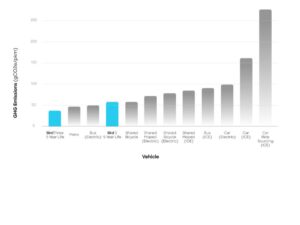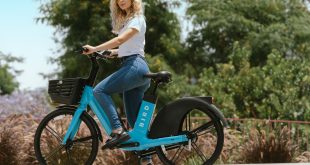E-scooter brand Bird has one of the lowest emission vehicles in Europe, according to an industry first life cycle analysis paper it published this year.
Launched in Paris earlier this week, US-based micromobility manufacturer Bird commissioned the independently verified life cyclist analysis of its Bird Three e-scooter, comparing it to public transport and other modes of transport.
The analysis, reviewed by International Organisation for Standardisation (ISO) based in Geneva, found that the five-year life-span of the Bird Three makes it among the lowest emitters of greenhouse gases of any vehicles on the road.

Shane Torchiana, CEO, Bird said: “Bird’s LCA sets a new industry standard for emissions reporting quality, enabling reliable comparisons across European modes and vehicles, and helping Bird to identify and reduce emissions wherever possible.
“Not only does this work further demonstrate our commitment towards the planet, but is a call to action for all other operators to follow the same standard so that together, we can address misconceptions around vehicle lifecycles and educate our city stakeholders with the information they need to make informed decisions when selecting a responsible micromobilty partner.”
Travellers in European cities who take a Bird Three account for on average approximately 21% less greenhouse gas emissions per kilometre than taking metro systems, 77% less than driving a gas-powered car, and 87% less than taking a ride-hail car.
The LCA emissions model was reviewed and documented by Ramboll, an independent Denmark-based engineering and consulting company, specialising in sustainability and corporate responsibility. The LCA is being critically reviewed by EarthShift Global, a third-party ISO expert, to ensure that the methods, data and analysis are consistent with ISO standards for LCA. Bird’s LCA is also one of the industry’s first aligned with the New Urban Mobility Alliance’s (NUMO) forthcoming LCA guide for cities.
Manufacturing and assembly of Bird’s electric scooters is included within the LCA along with additional manufacturing of components for replacements, transportation of vehicles to target European cities, charging and fleet management and scooters’ disposal at end-of-life. The LCA does not take account of Bird’s renewable energy credits, carbon offsets, or robust program of end-of-life recycling.
Features in the Bird Three include Aerospace-grade aluminium and the Bird Three’s proprietary battery system which travels farther on fewer charges, with industry leading IP68-rated battery protection to keep it safe from dust and water. The vehicle also boasts independently tested and verified impact resistance; pneumatic tyres and smart acceleration technology to reduce wear and tear.
“By following expert recommendations and best-practice methods for their LCA, Bird is demonstrating leadership in their commitment to rigorous, transparent greenhouse gas emissions reporting, which will enable city governments to make more informed decisions and – if widely adopted – enable emissions reductions across the micromobility sector,” said Leah Lazer, research associate, New Urban Mobility alliance (NUMO), World Resources Institute.
 micromobilitybiz Delivering news updates to the micromobility industry, focusing on e-bikes, e-scooters and green transport
micromobilitybiz Delivering news updates to the micromobility industry, focusing on e-bikes, e-scooters and green transport




